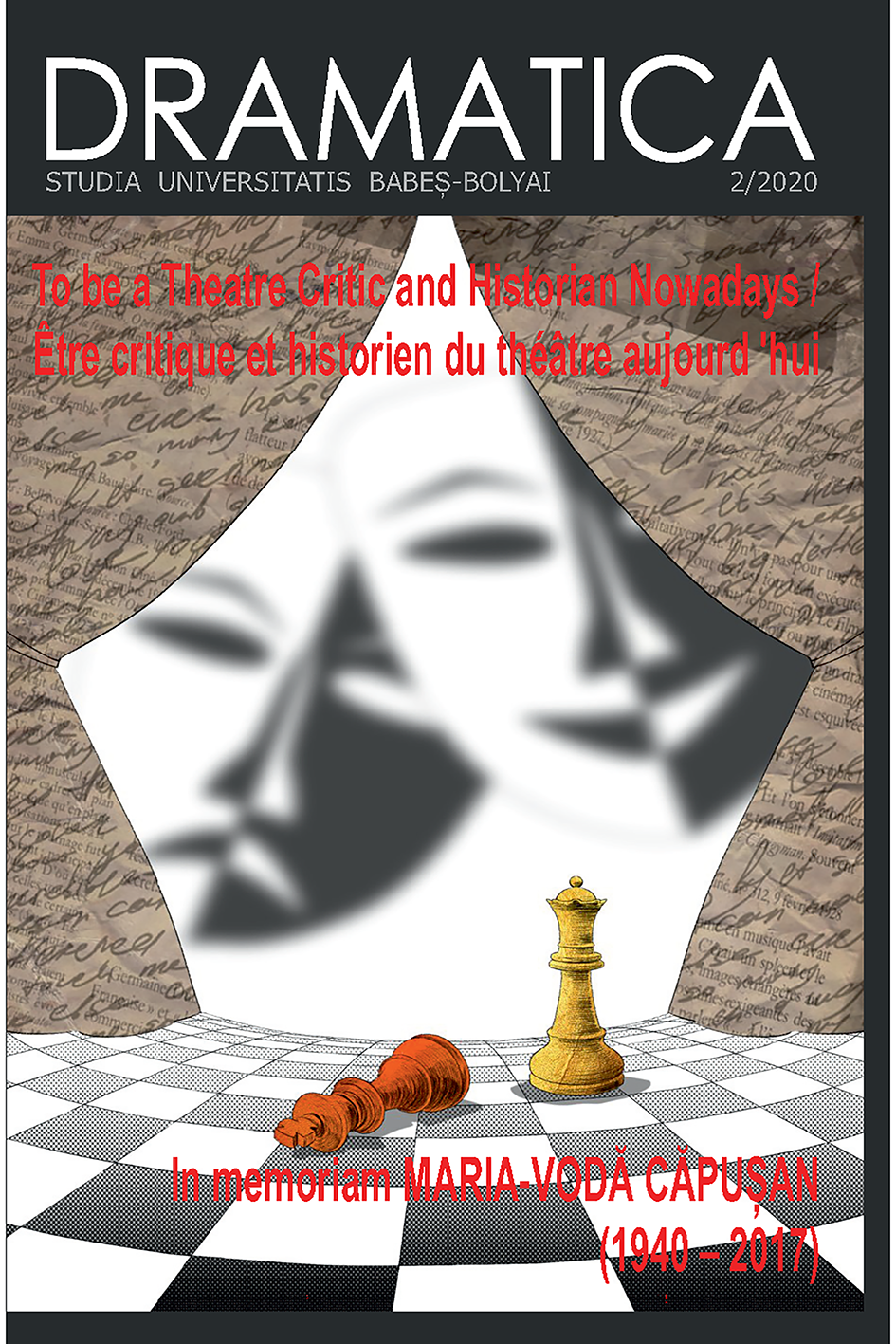L’impromptu en question : de Molière à Giraudoux et à Ionesco
DOI:
https://doi.org/10.24193/subbdrama.2020.2.06Keywords:
poetics, mise en abyme, meta-text, meta-theatricality, verismo, illusion.Abstract
The Impromptu in Question: From Molière to Giraudoux and Ionesco. The starting point of this research is a line from Eugène Ionesco’s play The Alma Impromptu: “theatre, of course, changes, for the theatre is life. It’s changing like life”. The author of this article aims to verify the viability of this assertion by analysing the following plays: Molière’s The Versailles Impromptu, Giraudoux’s The Paris Impromptu, and Ionesco’s The Alma Impromptu. This constitutes an investigation on some grounding points of the topic. The critical meta-text is focused on aspects such as the status of the playwright, the purpose of theatre, the fabrication of the dramatic text, the relation author/text/comedian/public and the status of theatre as a social phenomenon rooted in the lifeline of collective existence. However, the meta-text is constantly scrambled by a certain form of auto-referential writing unveiling its own mechanisms, the creative process being the play on its own. Molière puts himself on stage while writing his play, as author, director and comedian, Giraudoux shows himself through his character Jouvet, Ionesco places himself on stage while writing his play, being disrupted by three characters, “Ph.Ds in theatrology” who write a play themselves, encasings present in Molière and Giraudoux’s works as well. Consequently, the reflection on dramatic arts shows, in its essence, the same poetics and/or poïetics, the mirroring games favouring structural and thematic duplications, and depicts the evolution of technical devices and creative specificity shared with an audience more and more discerning.
References
Textes primaires :
Giraudoux, Jean. L’Impromptu de Paris, pièce en un acte. Paris : Grasset, 1937.
Ionesco, Eugène. L’Impromptu de l’Alma ou Le caméléon du berger, in Théâtre, tome II, 9 59. Paris : Gallimard, 1958.
Molière. L’Impromptu de Versailles, in Molière, La Critique de l’École des femmes, L’Impromptu de Versailles, 49 77. Paris : Larousse Classiques, 1974.
Bibliographie critique :
Arasse, Daniel. Le Détail. Pour une histoire rapprochée de la peinture. Paris: Flammarion, 1992.
Barthes, Roland. La Chambre claire. Note sur la photographie. Paris: Gallimard/Seuil, 1980.
Barthes, Roland. Essais critiques. Paris : Seuil, 1961.
Bergson, Henri. Le rire. Essai sur la signification du comique. Paris : P.U.F., 1997 [1900].
Dandrey, Patrick. L’Amour médecin de Molière ou le mentir vrai de Lucinde. Paris : Klincksieck, 2006.
Dandrey, Patrick. « Le mystérieux monsieur Poquelin. » Le Magazine littéraire, no 575 (2017) : 70 72.
Ducrot, Oswald. La preuve et le dire : langage et logique. Tours : Mame, 1973.
Genette, Gérard. Figures V. Paris : Seuil, 2002.
Ionesco, Eugène. Notes et contre notes. Paris : Gallimard, 1966.
Magny, Claude-Edmonde. Précieux Giraudoux. Paris : Seuil, 1945.
Maingueneau, Dominique. Pragmatique pour le discours littéraire. Paris : Bordas, 1990.
Jacquart, Emmanuel. Le théâtre de dérision. Paris : Gallimard, 1966.
Kowzan, Tadeusz. « Les trois impromptus : Molière, Giraudoux et Ionesco face à leurs critiques ». Revue d’Histoire du théâtre, no 127 (1980) : 261 280.
Perrin, Laurent. L’ironie mise en trope. Du sens des énoncés hyperboliques et ironiques. Paris : Kimé, 1996.
Petreu, Marta. « Un Gorgias de Bucureşti », in Ionescu în ţara tatălui [Ionesco dans le pays du père], 11-65. Iaşi : Polirom, 2012.
Ricœur, Paul. La Métaphore vive. Paris : Seuil, 1975.
Robichez, Jacques. Le théâtre de Giraudoux. Paris : SEDES, 1976.
Robichez, Jacques. « L’Usage de l’allusion dans le théâtre de Giraudoux ». Cahiers de l’Association internationale des études françaises, no 34 (1982) : 237 244. https://www.persee.fr./issue/caief_0571_5865_1982_num_34_1.
Ubersfeld, Anne. Lire le théâtre. Paris : Éditions Sociales, 1977.
Yourcenar, Marguerite. D’Hadrien à Zénon. Correspondance 1951-1956, ed. Colette Gaudin et Rémy Poignault. Paris : Gallimard, 2004.
Downloads
Published
How to Cite
Issue
Section
License
Copyright (c) 2020 Studia Universitatis Babeș-Bolyai Dramatica

This work is licensed under a Creative Commons Attribution-NonCommercial-NoDerivatives 4.0 International License.


